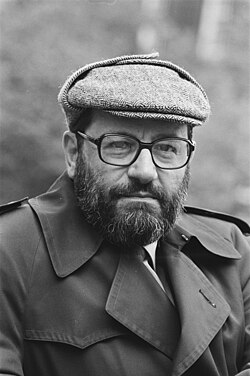Umberto Eco Quote
This has nothing to do with realism (even if it explains realism). A completely real world can be constructed, in which asses fly and princesses are restored to life by a kiss, but that world, purely possible and unrealistic, must exist according to structures defined at the outset (we have to know whether it is a world where a princess can be restored to life only by the kiss of a prince, or also by that of a witch, and whether the princess's kiss tranforms only frogs into princes or also, for example, armadillos).
Umberto Eco
This has nothing to do with realism (even if it explains realism). A completely real world can be constructed, in which asses fly and princesses are restored to life by a kiss, but that world, purely possible and unrealistic, must exist according to structures defined at the outset (we have to know whether it is a world where a princess can be restored to life only by the kiss of a prince, or also by that of a witch, and whether the princess's kiss tranforms only frogs into princes or also, for example, armadillos).
Related Quotes
About Umberto Eco
Umberto Eco (5 January 1932 – 19 February 2016) was an Italian medievalist, philosopher, semiotician, novelist, cultural critic, and political and social commentator. In English, he is best known for his popular 1980 novel The Name of the Rose, a historical mystery combining semiotics in fiction with biblical analysis, medieval studies and literary theory, as well as Foucault's Pendulum, his 1988 novel which touches on similar themes.
Eco wrote prolifically throughout his life, with his output including children's books, translations from French and English, in addition to a twice-monthly newspaper column "La Bustina di Minerva" (Minerva's Matchbook) in the magazine L'Espresso beginning in 1985, with his last column (a critical appraisal of the Romantic paintings of Francesco Hayez) appearing 27 January 2016. At the time of his death, he was an Emeritus professor at the University of Bologna, where he taught for much of his life. In the 21st century, he has continued to gain recognition for his 1995 essay "Ur-Fascism", where Eco lists fourteen general properties he believes comprise fascist ideologies.
Eco wrote prolifically throughout his life, with his output including children's books, translations from French and English, in addition to a twice-monthly newspaper column "La Bustina di Minerva" (Minerva's Matchbook) in the magazine L'Espresso beginning in 1985, with his last column (a critical appraisal of the Romantic paintings of Francesco Hayez) appearing 27 January 2016. At the time of his death, he was an Emeritus professor at the University of Bologna, where he taught for much of his life. In the 21st century, he has continued to gain recognition for his 1995 essay "Ur-Fascism", where Eco lists fourteen general properties he believes comprise fascist ideologies.
